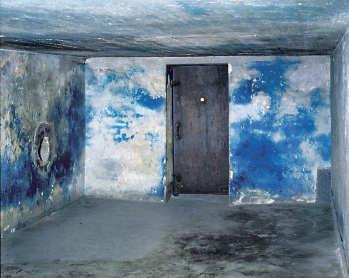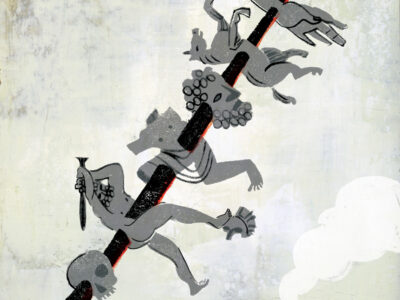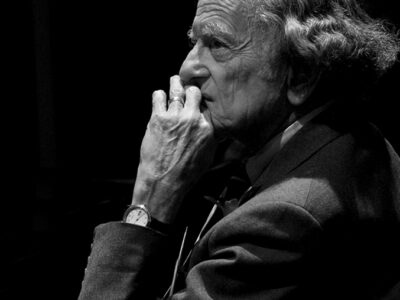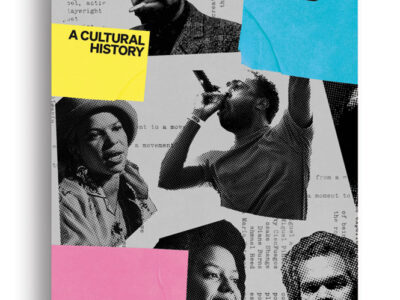
On the Holocaust remembrance day of Yom Hashoah, members of Tiferet Bet Israel synagogue in Blue Bell, Pennsylvania, gathered for a presentation of “Forms of Blue,” a poem by Harrison Tao C’74 about the gas chamber at Majdanek, Poland, and those who died inside it. Lily Redner, a Holocaust survivor and educator whose parents died at Auschwitz, recalls sitting in the synagogue that day, flanked by local officials, and feeling physically sick as she listened to a recording of the poem and stared at an image of the gas chamber projected onto the wall. “I thought I was going to vomit. Then I started to look at the reactions of the other people and I thought the high-school students were very responsive, so I was grateful, because I believe in awareness and education.” The poem, she says, “gave a voice to the voiceless.”
Tao, a Chinese-born, Brazilian-raised poet who works for a global-management firm in Philadelphia, didn’t set out to write about the Holocaust, but when he saw a color photo of the Majdanek gas chamber in a book, he was “more or less driven” to do so. He was stunned by the vivid shades of blue on the walls in the picture. “My first reaction was ‘Wow. Look at the obscenity of the Nazis painting the interior of a gas chamber blue.’” Then he learned that the colors were actually the poisoned “breaths of people deposited time and again onto those walls.”
Tao, who is not Jewish, became obsessed about what it must have been like to be inside that chamber. He began researching its history and writing the poem in the form of a dialogue between the human voice, representing the people who went through the experience, and the empty room, bearing witness to what happened—an undertaking that lasted a year and a half. “It was a very difficult experience. I couldn’t not write it, even though every time I set down to do it meant putting me in a place where I didn’t want to be emotionally.”
The photo and poem were published together in the journal Kerem in 1995, but Tao says, “It kept hitting me as not something that should be static on paper, but something that should be experienced by a live audience.” So he put together a recording of the piece, read by actors, along with a large slide projection of the photo, and proposed the idea to synagogues and churches. The first time he presented the poem at an interfaith service in Doylestown, Tao recalls, one man came up to give him a bear hug, explaining that his mother was a Majdanek survivor who always said that “No one writes about Majdanek.”
Though Tao has not been to Majdanek himself, his poem has traveled there twice for Holocaust services. In addition, a friend who is a teacher in Israel has used it in her classroom. Tao would like to see the picture and recording eventually packaged as a teaching aid to help more students learn about the Holocaust.
Forms of Blue “does not preach anything,” he says. “It’s not about politics, not about guilt or blame. It’s about individual experience.” The poem is also hauntingly accurate, noting, for example, how long it would have taken people to die from the Zyklon B gas in a room of that size: “a thousand heartbeats until the last/ heart/ beat,/ until the puddles of stillness spread/ to a single peace, entwined with strangers/ and beloved,/ repelling strangers/ and beloved,/ anonymous and forgotten…”
He doesn’t want students to look upon the people who died as only victims, and to think, “’It’s not one of us. It can’t happen again.’ You can’t sanctify them for their lives either. You have the range of every human foible [represented] as well, but regardless of what they were, no one deserves this, and what happened was horrific.”
Tao is now doing painstaking research for two more poems which he hopes will also give voice to the voiceless. One is based on an article he read about the discovery of a safe which contained documents for a grand-jury trial of several cattle rustlers who massacred 31 Chinese immigrants who were panning for gold in a remote section of the Snake River in 1887. The miners were killed, mutilated and dismembered. “What struck me,” Tao said, “was that only a few of the victims got a decent burial. Farmers in the area are still finding bones in the river. Those people came to trial and were not convicted. Here these [immigrants] take an incredible journey, driven by poverty, they make their way here, and die this horrible death—and nobody knows who they are. Their families at home don’t know their fates.”
The second poem he’s working on is based on another article about how during the German siege of St. Petersburg during World War II, seven curators of the grain repository —which represented the biodiversity of Russian agriculture—starved to death rather than eat the grain. “For me it was, ‘Who are these people and what are their stories? How do you arrive at a decision like that?’ I can visualize the finished product being performed on stage, with seven voices talking.” In this way, Tao can bear witness to the intersection of individual lives with history, just as he did with Forms of Blue:
“With your one-color palette/ you left the wings of birds, of the ink for words/ the blues of majesty, and honor, and hope:/ you deposited them here, layer by layer;/ shade by shade, all the blues in the world.”
Forms of Blue
By Harrison Tao
(Narrator)
The room is empty now, the bricks
not dispersed baking bread,
lining garden paths,
echoing psalms.
They have remained,
an honor guard stained with screams
neither fire nor rain can purge: bricks
innocent before conscription into these walls
are now tattooed with a breathless Blue
that transforms all blues.
(Principals-Two voices)
We were clay
I am clay
God shaped us into Man-kind
Man shaped me to his will.
God breathed life into us
Man gave me function
Man-child and woman-
We sang, we loved, we created.
(Principals in unison)
In work, warmth, and worship
We praised God together.
Yet a darkness of spirit came.
Where went the music?
Where flew the angels?
What madness overtook Creation?
(Principals-Two voices)
In Majdanek, tricked into this room,
I was the room.
this windowless, barren room,
Yes
herded through the door
stumbling
to hold a loved hand,
to lose a loved hand,
Yes
the only light
halos
over the entering heads,
Yes
bewildered, the nakedness
too sudden to shame
Yes
so quickly pressed to stand
feet on feet,
backs against breasts,
breasts against backs,
spooned together without desire,
rasping together hairs scratching,
noses avoiding noses,
Yes
we shouted names that collided
in the shrinking air,
necks stretching for more
than an echo,
heads turned toward the
one door into Heaven
one door into Hell,
our arms raised,
not to plead, to surrender,
to bid an unseen farewell,
but to make space for more
Those were the orders
until we could not move,
until two hundred moved as one
waiting for a Bath and Disinfection
The sign is there still.
And then a miracle:
the voices of the small ones
who ate straw in the trains,
who suckled everything and nothing,
those voices, muted by uniforms and mothers,
returned:
as they were tossed
onto our outstretched hands
their voices returned,
in their weightless floating, wanted
and unwanted on our fingertips,
their voices returned to shred the air
to multiply our despair …
Their cries had no equal.
Then a silence,
too short for a curse,
when the door shut to an eye,
a dybbuk’s eye
eclipsing the last light,
He was an officer
sealing-in a darkness
not of the Beginning,
not of the Hope before the Beginning,
but from beyond the End
Yes
a drowning darkness
erupting with all the names of God,
all the cries of childhood …
Yes
and into that Babel dark
a brief ring of almost-light
on the ceiling overhead, a light
It was the chute opening
pelting faces, tapping shoulders
with a cascade of dry hail,
It poured from cans
ten heartbeats of dusty light
that released a second silence,
too short for a prayer,
a rippling murmur muting each in turn
with their first scent
of bitter almonds …
Take a breath, it’s safe now.
… For a thousand heartbeats
elbows to faces,
hands to throats,
nails against flesh against bricks,
and sounds that were not words
the gasping to breathe
and not breathe,
each alone
and not alone
surging
to press the cool walls,
to press through the cool walls …
I was made too well
… a thousand heartbeats until the last
heart
beat,
until the puddles of stillness spread
to a single peace, entwined with strangers
and beloved,
repelling strangers
and beloved,
anonymous and forgotten …
There were no witnesses.
I am your witness.
Here, I have remained
because you came,
I had no choice.
Four hundred days my doors opened
and closed on you
as you brought in the world;
as you left the world.
Day by day you transformed my gray,
roomful by roomful your poisoned breaths
painted and re-painted clouds,
brought me the blues of distant waters,
of the bridges that cross those waters,
of the Summer dresses by those waters,
With your one-color palette
you left the wings of birds, of the ink for words,
the blues of majesty, and honor, and hope:
you deposited them here, layer by layer,
shade by shade, all the blues in the world.
For all Time I am your witness.
Until your ashes return to steps,
I am your witness:
When you flattened against me,
when your sweat primed me,
when you scratched and gouged me,
when your hands fisted never to reopen,
when they reached and found no hand,
when they pounded me leaving skin,
when your last breaths tattooed me with these hues,
it sealed our covenant:
You gave me life,
I am its witness.
Coda (narrator)
The dead do not eat the bread
smell the flowers, raise their voices.
Yet they live, released from this room,
in every glimpse of blue,
the open eye cannot avoid.




